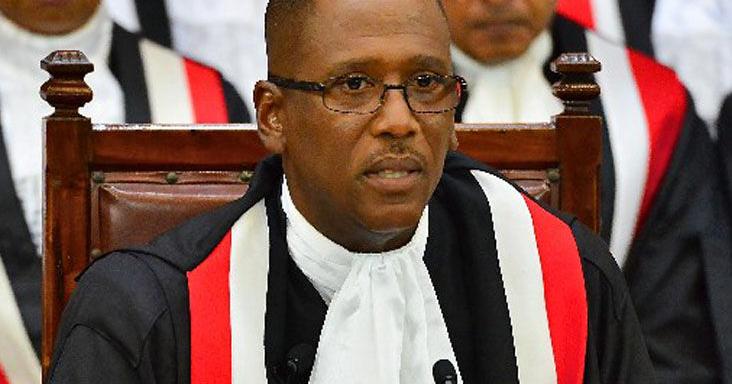THE Salaries Review Commission (SRC) is currently contemplating an unconstitutional move to cut the salaries of High Court masters that were fixed by Parliament, Chief Justice Ivor Archie disclosed yesterday.
Also, for the past 13 years, and in spite of two salary increases for public servants in the interim, the Chief Justice lamented that judges have not received any salary increase since 2011.

LAW TERM OPENS: Chief Justice Ivor Archie bows to the Colour following his inspection of the Trinidad and Tobago Police Service guard of honour on Frederick Street, Port of Spain, yesterday during the ceremonial opening of the 2024/25 law term. At centre is Police Commissioner Erla Christopher. See Page 5. —Photo: JERMAINE CRUICKSHANK
“Judicial officers, just like everyone else, have constitutional rights,” Archie said, adding that if the Privy Council has to get involved over the proposed cutting of the salaries of the masters, then so be it, but “it would be sad indeed if they have to tell us how to behave. It would be a shame.”
Archie lamented that even though High Court masters carry out a very crucial function in the administration of justice, which is made even more challenging by a lack of staff and the heavy case load, the SRC is deciding whether to reduce their salaries.
“They (the SRC) told me that they have senior counsel advice that what Parliament did (fixing the masters’ salaries) was unconstitutional. More fundamentally, this was done without any prior discussion or attempt at justification.
“They also claim that judges’ salaries, which they recommended as being appropriate in 2011, should not be increased over a decade later despite the effects of inflation and two salary increases for public servants in the interim.
“When a public agency takes the position that it does not have to obey a law passed by Parliament because a lawyer thinks it is unconstitutional, we are in trouble,” he said.
The SRC, like everyone else, must obey the law so long as it has not been invalidated, Archie added.
Staffing worse off
As he did during last year’s ceremonial opening, as well as on other past occasions, Archie focused his attention on the lack of administrative staff, the Judiciary’s inability to hire its own workers and the impact it has on the administration of justice.
The biggest mistake one can make, he said, was to assume that the administration of justice was only about judicial officers and court buildings.
“The lack of human resources and adequate compensation does not facilitate a motivated workforce and efficacious management of the Judiciary. The lack of autonomy in the administration of our human resources that I have spoken about repeatedly continues to impact our ability to attract, manage and retain the talent required for modernisation.
“Sadly, despite my misplaced optimism, I must return this year to report that we are pretty much in the same place if not worse off where staffing is concerned,” said the Chief Justice, adding: “I will keep giving this speech until something happens.”
Currently, staff at the Judiciary are selected by the Public Service Commission (PSC) but in most, if not in all instances, those workers, in spite of their academic qualifications and years of experience, do not possess the understanding of the court system to effectively carry out their functions, he said.
“Staffing structure and compensation and benefits packages are determined by stakeholders who do not understand and respect the inherent need for us to do things differently,” Archie added .
Further, even after those staff members become somewhat knowledgeable of the workings of the court system, they are then “poached” by other public bodies, leaving the Judiciary with a continuous lack of efficient workers, he said.
Not just that, but given the shortage, Archie said the remaining staff members are severely overworked, which, in turn, creates a strain on their mental health due to the nature of the job as well as poor balance between their work and private lives, all for very poor compensation.
“This has to stop,” said Archie, pointing out that since 2020, some members of staff have been “playing dual roles, awaiting approvals of staff that have failed to materialise”.
He noted that currently, the Judiciary has the highest case load in the region in spite of it not being the most populous.
The quality of work of some judicial officers is often-times more respected in other jurisdictions and, because of this, those judicial officers would decide on taking up jobs in other countries in the region where they receive superior compensation for less stressful work and far smaller workloads, he said.
To add insult to injury, the Chief Justice said it is often-times noticed by judicial officers and staff members via traditional as well as social media that there is a perception by some that judicial officers are “not working hard enough”.
“Nothing can be further from the truth… They opine that we like to give trouble, we think we are special, we want to do our own thing or we are always talking about independence. They presume to, but do not understand court operations (and) the unique nature of the jobs within the organisation and our specialist staffing needs,” he said.
“By all means, hold us accountable, but give us the ability and the resources to make it happen. Do not ask for an imposed responsibility and demand accountability without granting authority and reasonable autonomy… This is not about pointing fingers, that is never productive. But, what we in the Judiciary will not do is accept licks for something that is outside of our control,” the Chief Justice said.

